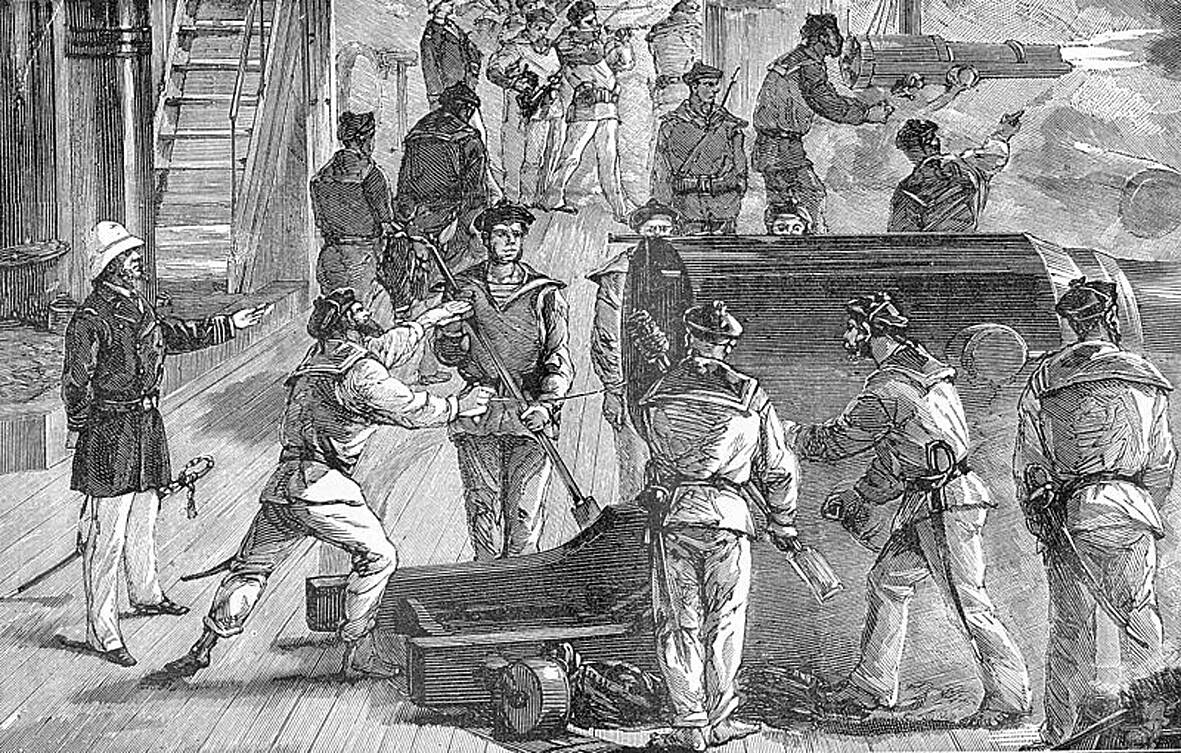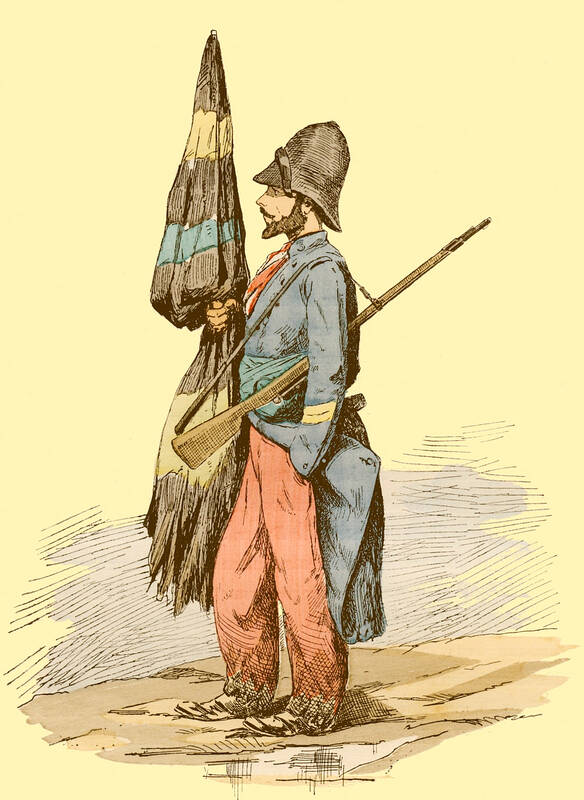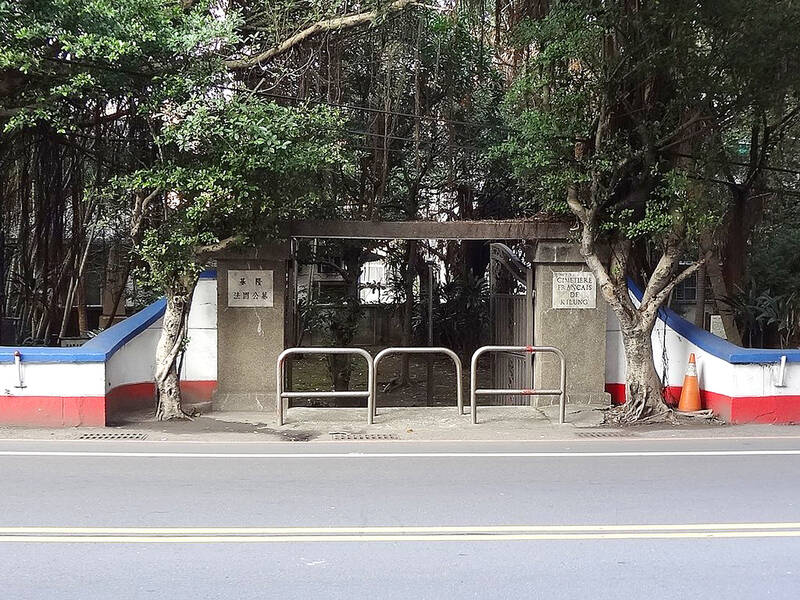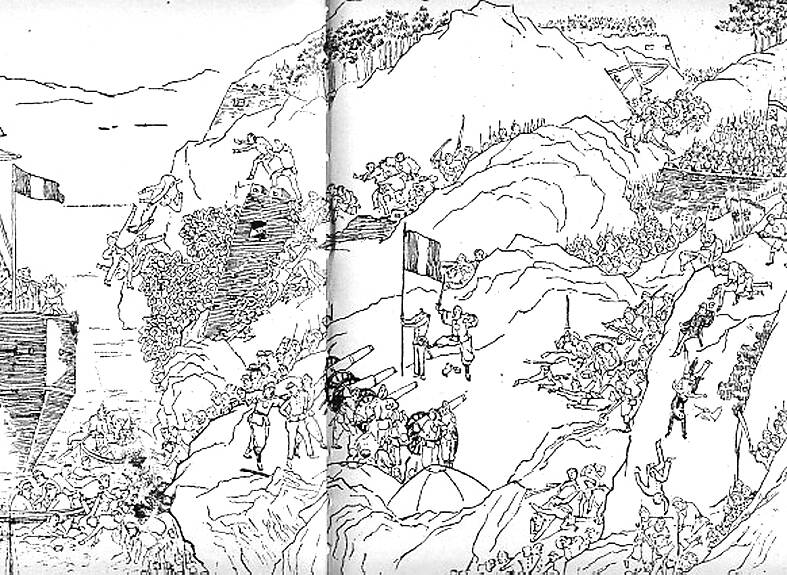The Sino-French War often appears to be a speed bump in history, quickly bounced over on the way to the monumental changeover to Japanese rule in 1895. The occupation of Keelung left us with some interesting defense works and a trench system still crumbling away on the city’s ridges, but the French occupation of the port for seven months in 1884 and 1885 is largely remembered for the cemetery it left behind, a popular media historical topic.
The Treaties of Tianjian between the Manchu Empire and Russia, France, the UK and the US opened up the colonial holdings of the Manchus not only to western business interests, but also to foreign missionaries. Catholic and protestant missionaries soon moved into Taiwan.
George Mackay, the most famous of the Western missionaries working in Taiwan, arrived in 1871, his presence a result of the Treaty. The Wiki page on Mackay has a robust discussion of how Christian converts burned Chinese “idols.” However, there is nothing on that page or the Wiki page on the French occupation of Keelung of how the French invasion led to the burning and looting of Christian churches across northern Taiwan.

Photo courtesy of Wikimedia Commons
Indeed, it is surprising how difficult it is to find detailed information in English on the repeated attacks on Christian churches that took place at various times in Taiwan after 1860. They seem to have dropped out of the collective memory, temporary blips on the march of progress, seldom referred to in popular media presentations.
ATTACKS ON CHRISTIANS/CATHOLICS
The redoubtable James Davidson in the classic Island of Formosa Past and Present (1903) identifies the pivotal year as 1868: “...a year which made it plain that either the foreigners must forsake Formosa once and for all,” or they must find some more successful way of dealing with Manchu officialdom than useless formal complaints.

Photo courtesy of Wikimedia Commons
Davidson argues that the campaigns against Westerners had been pre-arranged, since they emerged at both ends of Taiwan. Protestant missionaries had already been successfully evicted from Tainan, and the taotai (道臺), the island’s highest official, rejected a Roman Catholic land purchase in the city. Officials whipped up the population, and attacks on Christians and their churches in southern Taiwan began.
Nearby churches were sacked and destroyed, and local Christians attacked, one becoming the island’s first local Christian martyr. An account of the events cited by Davidson says that a Christian in Kaohsiung was murdered and “his body cut in pieces, and his heart eaten by some of the bolder of his murderers at the north gate of the old city.”
In May Roman Catholics in Tainan were attacked again and one of them was “bambooed” and imprisoned.

Photo courtesy of Wikimedia Commons
The attacks continued throughout the summer, in concert with confiscations of goods for export and, in August, imposition of absurd customs fees and a “mast tax,” the latter specifically forbidden by the Treaties. In July near Tainan, soldiers attacked and destroyed a church.
By September it was obvious to the British that something had to be done about the streams of broken promises and officially-sanctioned assaults on foreigners. These included, at one point, the taotai himself offering US$500 for the head of a foreigner who was traveling on the island using a consular passport, since the taotai would only issue permits to foreigners for travel to Kaohsiung and Tainan.
THE GUNBOAT AFFAIR

Photo courtesy of Wikimedia Commons
Autumn passed and the problems continued, with no redress in sight. Finally in November the British Consul in Takao, John Gibson, decided to take two gunboats and occupy Anping, saying that the fort was the key to the island’s capital. A Lieutenant Gordon led the expedition. On Nov. 22, the fort was quickly occupied as it had been deserted by its defenders, but since it was in terrible condition, the British forces were withdrawn and one of Gordon’s two gunboats sent back to Amoy with the news.
Three days later, 500 local soldiers arrived and started to repair the fort and install cannons. Gordon and his superiors, alarmed at the prospect of facing such a force with his lone gunboat, demanded that the repairs cease immediately or he would open fire, which he did at 3pm that day. Gordon led an attack on the fortifications that night, and by the next day, the taotai in Tainan was promising to fulfill any demand he made.
The gunboat affair secured indemnities for a merchant whose property had been at the heart of the disputes with the taotai, and for the protestant church that had been destroyed. Foreigners received the right to travel anywhere on the island. The authorities issued edicts and proclamations affirming that the things said about Christians were nonsense, and missionaries obtained the right to work on the island. The taotai and other officials were removed.
Davidson credits Consular Gibson with creating a great change in the way foreigners were treated in Taiwan. The island, he averred, once considered a land of great danger, became safer. Problems would occasionally appear, “especially in the north,” but officials, instead of laughing at foreigners, would resolve them.
At the same time events in Tainan were playing themselves out, the Americans and British brought in gunboats to Tamsui to end the anti-foreigner campaign there. Davidson writes: “the year 1868 may be said to have ended in a very satisfactory settlement of disputes long standing in the north and south.”
Though there were attacks on Christians in the late 1870s in the north, by and large things were quiet for foreigners. Far from universally hostile, “in fact in many districts the natives were very friendly,” Davidson observes of this period.
Not until the French invasion would there be extensive troubles for the churches. In October of 1884 there were attacks on churches amid accusations that Christians were cooperating with the French invaders. One of Mackay’s churches was hit, five churches were destroyed and several Christians murdered. But the rioting was suppressed by the end of the month. After the war Liu Ming-chuan (劉銘傳), the provincial governor, had three people executed and gave 10,000 taels of silver to Mackay for damages.
In our moral frameworks of history, Mackay is rightfully celebrated for loving Taiwan and leaving a medical and educational legacy that continues to affect the island. By contrast, Lieutenant Gordon and his tiny band of marines have been forgotten, or when remembered, contemptuously dismissed as “gunboat diplomacy.” Such discourses ignore how the Manchus came into possession of Taiwan in the first place.
But how could Mackay have done anything at all, without the threat of gunboats behind him?
Notes from Central Taiwan is a column written by long-term resident Michael Turton, who provides incisive commentary informed by three decades of living in and writing about his adoptive country. The views expressed here are his own.

A few years ago, getting a visa to visit China was a “ball ache,” says Kate Murray. The Australian was going for a four-day trade show, but the visa required a formal invitation from the organizers and what felt like “a thousand forms.” “They wanted so many details about your life and personal life,” she tells the Guardian. “The paperwork was bonkers.” But were she to go back again now, Murray could just jump on the plane. Australians are among citizens of almost 40 countries for which China now waives visas for business, tourism or family visits for up to four weeks. It’s

Climate change, political headwinds and diverging market dynamics around the world have pushed coffee prices to fresh records, jacking up the cost of your everyday brew or a barista’s signature macchiato. While the current hot streak may calm down in the coming months, experts and industry insiders expect volatility will remain the watchword, giving little visibility for producers — two-thirds of whom farm parcels of less than one hectare. METEORIC RISE The price of arabica beans listed in New York surged by 90 percent last year, smashing on Dec. 10 a record dating from 1977 — US$3.48 per pound. Robusta prices have